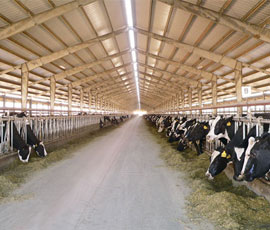New research on large-scale farming potential

Large-scale livestock operations, as seen in countries such as the USA and Saudi Arabia, can be sustainable but the farming industry must take steps to change their negative perception, according to new research.
In all three areas of sustainability – economic, environmental and social, including animal welfare – large-scale has the potential to deliver to high standards, says a new report from the Worshipful Company of Farmers.
The report – Can big be Beautiful? – provides evidence of how these so-called “super farms” can be successfully delivered and guaranteed within the UK environment and economy, as part of a successful and diverse food production landscape for the future.
In June, NFU president Peter Kendall said the UK needed more super farms to prevent food prices from rising too high and maintain high animal welfare standards.
In an interview with The Guardian newspaper, Mr Kendall called for more experimental work on super farms, such as the withdrawn 8,100-cow Nocton Dairies scheme, to help meet the UK feed its increasing population.
He argued that bigger farms could be more profitable and could therefore better afford equipment, more space and experts able “to protect the environment and animals”.
In recent months, the debate around large-scale farming has quietened down. But John Reynolds, master of the Worshipful Company of Farmers, said it was time the debate was brought to the fore again.
“We need to find a way to evolve food production to sustainably meet the ever growing demand for food around the world, but we also need to provide reassurance that new farming systems won’t ransom our future. These are the areas the debate needs to address,” said Mr Reynolds.
Partners in the launch, the Royal Agricultural Society of England (RASE), added that the UK must address the perceived issues around
large-scale production if it was to successfully create the diversity of farming systems it needs to meet future challenges.
RASE chief executive David Gardner said: “We appear to be stuck at an impasse where some of our most genuinely innovative farmers are having to hide their light under a bushel. These are the ones who should be demonstrating best practice and moving the industry forward. We need to find a solution that will support progress.”
David Alvis, co-author of the report, said: “Well conceived and professionally managed large-scale farming businesses can, as part of a
diverse farming industry, deliver a genuine and significant sustainability dividend that would be difficult to achieve within current farming systems.
“There are some very capable and innovative farmers out there already achieving outstanding results, but they are being forced to keep a low
profile because of the lack of understanding and misperceptions around scale.”
Intensive units have proved profitable in the USA and continental Europe. The USA has several farms with 10,000 pigs and Saudi Arabia has a super dairy with a herd of 37,000.
Critics of large-scale commercial farms believe they will bring more pollution, lower animal welfare standards and increase disease. They
consider smaller farms to be more animal and environmentally friendly.
VIDEO: NFU president clarified ‘super farm’ stance
